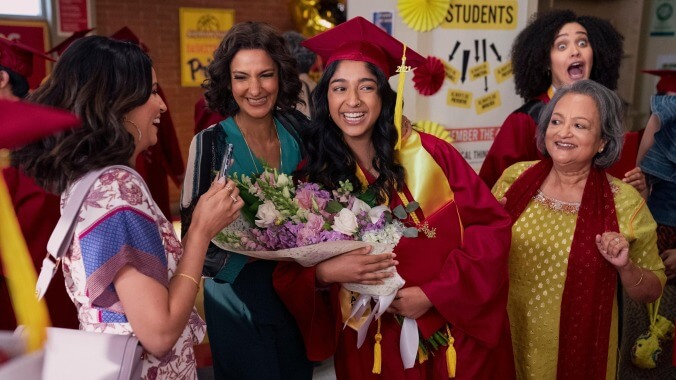Never Have I Ever season 4 review: Netflix bids farewell to one of its finest originals
The final season of Never Have I Ever is the dose of joy you need right now

The end of any beloved TV series usually invites a conversation about its legacy. It’s an especially hot topic right now thanks to recent series finales of favorites like Succession, Barry, and The Marvelous Mrs. Maisel, and how these shows left an indelible mark on the current landscape in only four or five seasons. While not celebrated enough by comparison, even though it should be, Netflix’s Never Have I Ever is just as much of a tentpole for multiple reasons. Primarily, the persistently delightful comedy stands tall as one of the first shows to center on a multi-generational Indian American family. And it ends as remarkably as it began, with season four dropping on June 8.
Mindy Kaling and Lang Fisher’s coming-of-age phenomenon will be remembered for its stellar lead performances, with breakout star Maitreyi Ramakrishnan and MVP Poorna Jagannathan deserving all the accolades. Who can forget drooling over a love triangle akin to the beloved YA dramas of the aughts? (RIP, Team Ben vs. Team Paxton) Like any good teen show, it also delved into fun high school shenanigans with aplomb, from unsupervised parties to Model U.N. trips, from classic cliques to memorable friendships. However, NHIE will mostly go down in history for its depictions of complicated, deeply relatable South Asian protagonists in mainstream media.
Devi Vishwakumar (Ramakrishnan) couldn’t be more chaotic if she tried (and try she often does). When the show began, she was mourning the sudden death of her father, channeling her loss into unparalleled rage and often feuding with her mother, Nalini (Jagannathan). Her mission: to shed her nerd persona, become popular, and lose her virginity to a hot jock. As irksome as she could get during this mission, it was a sigh of relief to watch a flawed, multi-dimensional South Asian girl trying to figure out a place in the world. Ramakrishnan’s heart-rending work helped further lift the material. And NHIE wasn’t a typical portrayal of brown women, even though the lens has slowly been shifting.
There have certainly been nuanced South Asian women on the small screen before, ranging from ER to New Girl. But this series is a game-changer because of the specificity with which it explores generations of Vishwakumar women, whether succumbing to or subverting diaspora stereotypes. Over four wholesome seasons, the show charted a unique path with Devi, Nalini, Devi’s cousin Kamala (Richa Moorjani, giving an increasingly potent performance each year), and grandmother Pati (Ranjita Chakravarty). Thanks to accurate representation in the writers’ room, the show never felt like it was checking off a diversity list. It’s representation with hilarious, heartfelt storytelling to support it. And the final season is no different.
 Keep scrolling for more great stories.
Keep scrolling for more great stories.
